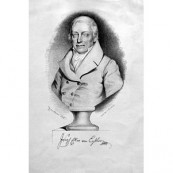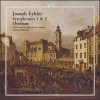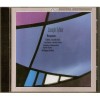Composers
Joseph Leopold Eybler (born February 8, 1765, in Schwechat near Vienna; and died July 24, 1846 in Vienna) was an Austrian composer and contemporary of Mozart.
Eybler was born into a musical family. His father was a teacher, choir director and friend of the Haydn family. Joseph Eybler studied music with his father before attending Stephansdom (the cathedral school of St. Stephen's Boys College) in Vienna. He studied composition under Johann Georg Albrechtsberger, who declared him to be the greatest musical genius in Vienna apart from Mozart. He also received praise from Haydn who was his friend, distant cousin and patron.
In 1792 he became choir director at the Karmeliterkirche (Carmelite Church) in Vienna. Two years later he moved to the Schottenkloster, where he remained for the next thirty years (1794-1824). Eybler also held court posts, including that of court Kapellmeister (chapel master) (1824–33). The Empress Marie Therese commissioned many works from him, including the Requiem in C minor (1803).
Recently Added
Biography
Joseph Leopold Eybler (born February 8, 1765, in Schwechat near Vienna; and died July 24, 1846 in Vienna) was an Austrian composer and contemporary of Mozart.
Eybler was born into a musical family. His father was a teacher, choir director and friend of the Haydn family. Joseph Eybler studied music with his father before attending Stephansdom (the cathedral school of St. Stephen's Boys College) in Vienna. He studied composition under Johann Georg Albrechtsberger, who declared him to be the greatest musical genius in Vienna apart from Mozart. He also received praise from Haydn who was his friend, distant cousin and patron.
In 1792 he became choir director at the Karmeliterkirche (Carmelite Church) in Vienna. Two years later he moved to the Schottenkloster, where he remained for the next thirty years (1794-1824). Eybler also held court posts, including that of court Kapellmeister (chapel master) (1824–33). The Empress Marie Therese commissioned many works from him, including the Requiem in C minor (1803).




